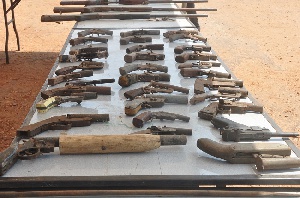Transport systems worldwide play a significant role in the proliferation of illicit small arms. In Ghana, individuals involved in the transportation of goods—such as bus, taxi, and trotro drivers, as well as parcel officers, ‘loading boys’ and ‘mates’ — may either knowingly or unknowingly facilitate the movement of illicit firearms.
Some of these individuals may deliberately engage in smuggling activities, using their knowledge of transportation routes to move small arms (guns) within the country to fuel criminal activity.
On the other hand, transport workers might contribute to the proliferation of illicit arms if they unknowingly transport concealed firearms hidden within parcels.
The unregulated movement of these lethal weapons poses serious risks, including accidental discharge, theft, and diversion into the illegal arms market.
When illicit small arms fall into the wrong hands, the consequences are profound. These weapons increase the likelihood of violent crimes, domestic violence, and turn communal tensions deadly, causing devastating harm to individuals and families. Moreover, they fuel terrorism and contribute to broader societal instability.
The transportation of illicit small arms and ammunition not only threatens lives but also undermines Ghana's efforts to maintain peace and stability. It perpetuates a cycle of violence and insecurity that slows down our progress towards sustainable development.
Under Ghanaian law, the burden of proof lies with anyone found transporting or possessing illicit firearms. Section 192 (1) of the Criminal and Other Offences Act, 1960 (Act 29) stipulates: “Despite the provisions of any other enactment, a person who has in possession, custody or control, without lawful excuse, the proof of which lies on that person, an explosive, a firearm or an ammunition commits a first degree felony: Provided that no prosecution shall be instituted under this section without the consent in writing of the Attorney-General.”
Convictions under this law are severe, with penalties ranging from a minimum sentence of 10 years to life imprisonment.
This underscores the importance for drivers, their mates, loading boys and parcel officers to be vigilant. Thoroughly checking parcels before they are loaded, refusing suspicious packages, and reporting them to the Ghana Police Service or the National Commission on Small Arms and Light Weapons (NACSA) are critical steps to preventing the illicit proliferation of small arms, thereby contributing to peace and security.
Let’s all work together to silence the guns, not our future.
General News of Tuesday, 30 July 2024
Source: Small Arms Commission

















